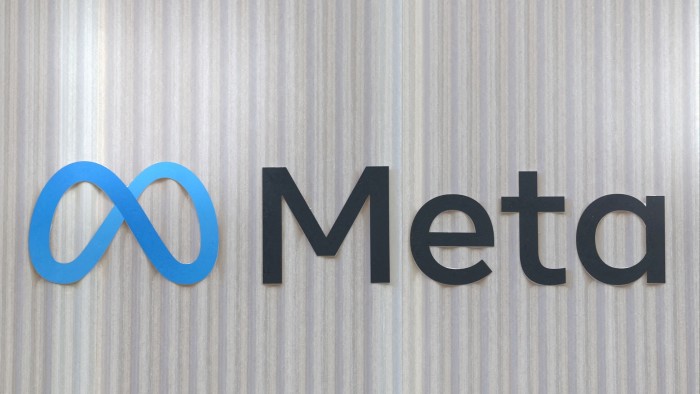Unlock the Editor’s Digest for free
Roula Khalaf, Editor of the FT, selects her favourite stories in this weekly newsletter.
Meta has reported better than forecast results and boosted spending as it steps up its push to lead in artificial intelligence, shrugging off Wall Street fears over a US-China trade war and economic uncertainty.
Revenues in the company’s first quarter rose 16 per cent from a year ago to $42.3bn, beating expectations of $41.4bn, the group said late on Wednesday. Net income jumped 35 per cent to $16.7bn, well above consensus estimates of $13.5bn. Meta shares were up more than 6 per cent in pre-market trading on Thursday.
The tech giant forecast its second-quarter revenues would be between $42.5bn and $45.5bn, with the midpoint of that range slightly higher than Wall Street’s forecast of $43.8bn.
“Our business is . . . performing very well, and I think we’re well positioned to navigate the macroeconomic uncertainty,” chief executive Mark Zuckerberg said on a call with analysts.
Zuckerberg has this year doubled down on his plans to make Meta the “AI leader”, boosting spending to develop its open source large language models and AI assistant. The company has also been improving the content it recommends in users’ Facebook and Instagram feeds, as well as the targeting of its advertising, in moves executives said were already paying off.
Meta estimated total expenses in 2025 in the range of $113bn to $118bn, down slightly from its prior outlook of $114bn to $119bn.
The bumper results appeared to assuage investor concerns that US President Donald Trump’s tariffs policy and related economic uncertainty could significantly knock Meta’s advertising business as well as Zuckerberg’s AI ambitions. Meta generates about 10 per cent of its revenues from China-based marketers, which have recently curbed spending.
Susan Li, Meta’s chief financial officer, acknowledged the company had experienced “some reduced spend in the US from Asia-based ecommerce exporters” and a drop-off in revenue from China-based advertisers in the gaming sector.
Meta on Wednesday raised its full-year capital expenditure forecast to between $64bn and $72bn, from $60bn and $65bn, citing “additional data centre investments” to support its AI push as well as an “increase in the expected cost of infrastructure hardware”. Li pointed to “uncertainty” around ongoing trade discussions as the driver of those potential cost increases.
The results come a day after smaller rival Snap declined to share financial guidance for the second quarter at its earnings, citing “uncertainty” around economic conditions in the coming months and “headwinds” in the current quarter. Snap’s shares closed 12.4 per cent lower on Wednesday.
Meta has made several recent AI announcements as it races rivals such as OpenAI, Elon Musk’s xAI and Microsoft to dominate in the field of generative AI.
In early April, Meta released the latest iteration of its open source AI model, Llama 4, while on Tuesday it launched a standalone app for its AI assistant, rivalling OpenAI’s ChatGPT app.
Meta also took a step towards becoming a cloud provider on Tuesday, announcing Llama API, a developer platform for those building on its Llama models, in a move welcomed by analysts.
On the call with analysts, Zuckerberg said there were “large” opportunities to monetise Meta AI, its assistant, by showing product recommendations and advertising, as well as offering a premium service for more complex tasks. But he added that the company would first focus on scaling for at least another year.
Zuckerberg said another primary focus was developing AI agents to help businesses with customer service and sales, for example on its WhatsApp messaging platforms, and continuing development of “AI devices” such as AI glasses.
The Meta chief executive has made overtures to Trump, visiting the White House several times this year in an effort to improve relations with the president, as lawmakers circle the AI industry.
Meta is also fighting a legal challenge from the US Federal Trade Commission, which alleges the company retains an illegal monopoly. Earlier this year, Zuckerberg failed in his attempt to negotiate a settlement in a bid to avoid going to trial.
Li also noted European regulatory risk. She warned that a decision by the European Commission that its “consent or pay” model fell foul of EU digital markets act could cause “significant impact to our European business and revenue”. Under the consent or pay model, users must agree to the processing of their personal data or pay a monthly subscription fee.
